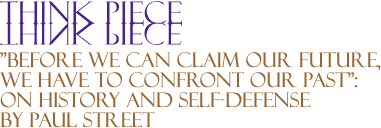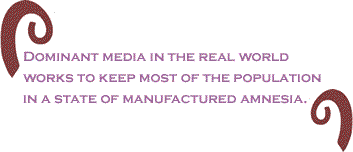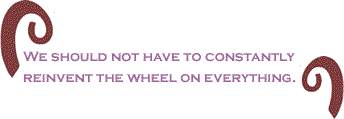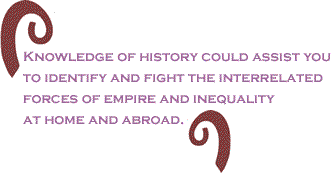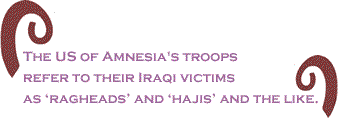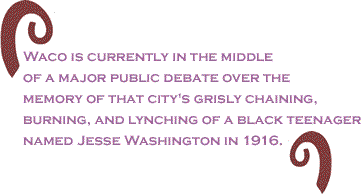
|
|||||||||||||||||||||
|
Driving around in my car with Chicago's WBBM News Radio (780 AM) recently, I got to hear two guttural syllables from the mouth of Fidel Castro. The full word and the Spanish language he was speaking were unintelligible. "That was Fidel Castro speaking to a throng in Havana, Cuba yesterday," the robotic corporate newscaster reported. "Castro was speaking to commemorate May 1st, which has traditionally been observed as a worker's day in other nations." This entire news item took about 15 seconds, in curious contrast to Fidel's notorious taste for giving 3-hour speeches. "In other nations." Do WBBM's writers know or even care that May 1's status as "the workers' day" hit its stride in the United States, in connection with the American labor movement's 8-hour struggle in the 1880s, and especially by the way in...CHICAGO. The Anarchist International Information Service has attempted to rescue that little, forgotten piece of history from what Edward Palmer Thompson used to call "the enormous condescension of posterity." At the site you will also find the following prescient observation: "…it is not surprising that the state, business leaders, mainstream union officials, and the media would want to hide the true history of May Day. In its attempt to erase the history and significance of May Day, the United States government declared May 1st to be 'Law Day', and gave the workers instead Labor Day, the first Monday of September – a holiday devoid of any historical significance." History, the real and radical record of the past is dangerous to rulers and masters the world over. It reminds us that contemporary social and political hierarchies are not "permanent," like the earth and wind and solar system. It tells us that existing power relations are in fact socially constructed products of human agency that can be subverted and supplanted over time...sometimes quite quickly (Cuba in the late 1950s, for example). History shows patterns and origins and the nature of certain phenomenon – the nature of fascism or imperialism or what have you – that can't be properly understood except with observation over time.
It teaches mistakes, wrong ways to proceed that recur again and again if they are not properly acknowledged, learned, and passed on. Santayana was right: "Those who fail to understand the mistakes of the past are doomed to repeat them." But history also teaches non-mistakes/the right way, like some key aspects of the way that Native North Americans related to the Earth and other life forms – far better than classic self-defeating Western white human supremacism over the earth and other living beings. We should not have to constantly reinvent the wheel on everything. Knowing history is to possess a critical weapon of ideological self-defense. Even in a militantly anti-historical society like the "United States of Amnesia" (Michael Eric Dyson's phrase), the rulers recurrently apply curious historical arguments and try to wrap themselves in the symbols and struggles of the past to justify big imperialist, racist and other toxic productions they want to carry out with minimum possible mass interference in the present and future. The official US Hitlerization/Nazification of just about every official Evil Other we've been supposed to wage war against since WWII is an example. If you know what German fascism/Nazism really was and the very real threat it posed to humanity (in alliance with a Japanese variant), then you were in a better position to evaluate the Bushcons' imperial effort to make Saddam's weakened Iraq into some kind of significant threat to Americans and world peace on par with the Third Reich. If you know about America and the West's long history of oil-driven intervention against democracy and independent development in the Middle East (please see historian Rashid Khladi's recent book Resurrecting Empire: Western Footprints and America's Perilous Path in the Middle East, Boston, MA: 2004), then you are in a stronger position to suspect and investigate other motives. You are also more likely to understand the reasons for Arabs' resistance to American and British intervention and their related disbelief in Bush's ridiculous claim to be exporting "freedom" and "democracy" to Muslim civilization. This knowledge could save you from getting your ass blown off in Iraq. It could save you from killing an innocent Iraqi family at on occupation check point (try living with that in your own personal history). It could assist you in your effort to identify and fight the interrelated forces of empire and inequality at home and abroad. If you know what Jefferson and Madison actually said, wrote, and believed, you are in a better position to evaluate the administration's absurd claim to be honoring the American nation's founding values by giving yet more of the nation's already hyper-mal-distributed wealth to the super-opulent few. If you know something about the egalitarian (what we would today called socialist and perhaps left-anarchist) values and behavior of historical Jesus (see Richard Crossan's book by that name), then you are in a better position to appreciate and resist the literally non-"Christian" (if we want to wrap the radically egalitarian sentiments of many Galilean peasants and artisans in the name of one mythologized historical personality) nature of the US Evangelical right wing, which is radically authoritarian and largely racist and more than friendly to corporate plutocracy and aristocratic class rule.
If you know there is a rich social, political, cultural, intellectual and economic history – a broad civilizational record – prior, and in part opposed, to "modern" capitalism then you are in a better position to see through the infantile idiocy of the notion of our soulless "cash nexus" bourgeois society as the product of timeless "Human Nature" or God's will or other such nonsense as that. It's not for nothing that the erasure, effacement, and recurrent top-down revision of history is a central theme in the great dystopian novels of totalitarian rule that were published in the last century, including Orwell's Nineteen Eighty Four, Huxley's Brave New World, and Bradbury's Fahrenheit 451. And it's not for nothing that dominant media in the real world (which reminds me more of dystopic science fiction everyday) works to keep most of the population in a state of manufactured amnesia: fed only small, selected, and biased parts of the past record, with the record recurrently revised in accordance with shifting events and new ideological requirements. A recent example: the Chicago Tribune recently published a retrospective piece on the fall of Saigon (the American exit from South Vietnam in April 1975) bearing the title "Some Wounds of [the Vietnam] War Healed – Many Others Won't Go Away." There's nothing about the people of Vietnam in this article on "the Wounds" of a war that was fought on their own devastated land and cost literally millions of their lives (as many 3 million Vietnamese were killed between 1962 and 1975), inflicting horrible direct and "collateral damage" that lasts to this day.
"Thirty years after the war's end," this article says, the Vietnam War "remains a catch-all metaphor for [America's] most traumatic period in the last half century" and "still evok[es] anger, ambiguity, and resignation." All this lingering emotion and conflict about the war is understood as a tactical (not moral) "mistake" and "defeat." The notion that the American assault on Vietnam was a terrible imperial crime enacted against the people of a relatively tiny peasant nation, is entirely invisible. Vietnam's proportionately greater trauma, inflicted by imperial armed forces who routinely referred to Indochinese as "gooks," is deleted from the record. It's all "down the memory hole," to quote Orwell's Nineteen Eighty Four. We are thereby encouraged to linger on in amnesiac oblivion to the crime we continue to perpetrate in Iraq, where we appear to have killed 100,000 civilians just between April 2003 and October 2004. It is not uncommon, by the way, for the US of Amnesia's troops to refer to their Iraqi victims as "ragheads" and "hajis" and the like. (See Bob Herbert's recent Times column, "From 'Gook' to Raghead.") Those who fail to acknowledge the crimes of the past are doomed to repeat them. Funny how dominant US media's disregard for the real past jibes with the sentiments of the Prime Minister of the authoritarian "communist" Vietnamese government. According to the May 1 (May Day) New York Times, that official – Phan Van Khai – marked the fall of Saigon by "sen[ding] out a message...urging all sides to close the past, look to the future." The Vietnamese state is seeking lucrative foreign investment deals and encouraging an ongoing "rush to global capitalism" (in the Chicago Tribune's words) that hopes for American good will and does not stand to profit from serious confrontation with the terrible record of the past. Forget. Move on. (For some of that record see the opening paragraphs of my recent Znet piece, “Rethinking America’s Vietnam ‘Defeat’: Thirty Years Later.”) Later in the May 1 issue of the Times (section 1, p. 18), you can read – in a historically sensitive article (nicely done, Ralph Blumenthal) – a different message from Raymond Bailey, a Baptist minister in Waco Texas. "Before we can claim our future," Bailey says, "we have to confront our past." Bailey is in the Times because Waco is currently in the middle of a major public debate over the memory of that city's grisly chaining, burning, and lynching of a black teenager named Jesse Washington in 1916. Under trial for an alleged rape of a white woman, Washington was "snatched and mutilated and burned alive outside City Hall before some 15,000 spectators – half of Waco's population at the time – and [with] a photographer alerted in advance to shoot picture postcards. Afterward, the charred corpse was dragged through the streets and hung from a telephone pole." Texas, it turns out, was home to 500 "of the 4, 697 recorded lynchings [in the US, mainly blacks murdered in the South] between 1880 and 1930." Currently, some black and allied white (including Bailey) activists are pushing to commemorate the lynching through the creation of a public monument. Many of the local white people don't want to see that happen, with the grandson of Washington's alleged victim saying that "Waco is not that type of town anymore." Interestingly enough, the grandson says it's "a stupid idea to put up a monument to a black man who killed my grandmother."
Why does the race of the killer matter? Shouldn't he be upset about the memorialization of anyone who killed his grandmother? And how does he know that Washington was in fact the killer? According to Patricia Bernstein's recent book, The First Waco Horror: The Lynching of Jesse Washington and the Rise of the NAACP (2005), Washington was an "illiterate cotton hand," who signed his "confession" with an 'X.' He was convicted in an hour-long trial where his defense lawyers didn't ask a single question. The jury returned a guilty verdict in 4 minutes." Whatever "kind of town" Waco is today (no "haji" haters there, I hope), it has put up memorial markers for the loony tunes Christian rightist Branch Davidians (nearly 80 of whom were killed by federal forces in 1993). Waco also boasts "halls of fame for the Texas Rangers law officers and for Texas sports legends" and a "granite teardrop marking the 50th anniversary of [a 1953] tornado that killed 114 people" in Waco. "There is even," the Times reports, "a Dr. Pepper Museum, memorializing the Waco drugstore where the drink was invented in 1885." Recently, Bernstein was walking out of Waco's City Hall with a copy of her book under her arm. A receptionist saw the monograph and said, "Oh you don't want to read that," to which the author said, "I wrote it." I'm with Bailey and against the grandson, the receptionist, and Phan Van Khai. Open the book of history and keep it open in order to more effectively and democratically move forward. You'll find a lot that horrifies but also much that inspires and instructs. Paul Street is the author of Empire and Inequality: America and the World Since 9/11 (www.paradigmpublishers.com) and Segregated Schools: Race, Class, and Educational Apartheid in the Post-Civil Rights Era (New York, NY: Routledge, 2005 [forthcoming]). |
Your comments are always welcome. Visit the Contact Us page to send e-Mail or Feedback or Click here to send e-Mail to [email protected] e-Mail re-print notice
If you send us an e-Mail message we may publish all or part of it, unless you tell us it is not for publication. You may also request that we withhold your name. Thank you very much for your readership. |
| May 12 2005 Issue 138 |
|||||||||
|
|||||||||
|
|
|||||||||
| Printer Friendly Version | |||||||||
 |
|||||||||
 |
|||||||||
| |
|||||||||
| |
|||||||||





















